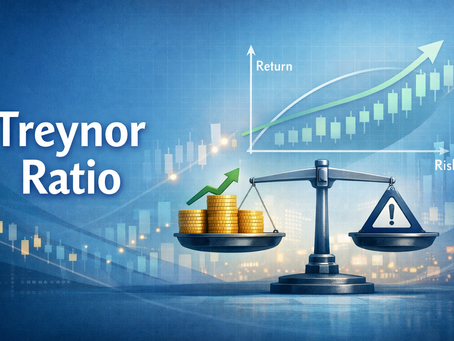top of page

Blog


Financial Word of the Day: Greeks (Delta, Gamma, Theta, Vega, Rho)
What Are the Greeks?
The Greeks are a set of measurements used in options trading to explain how an option’s price is expected to change when different factors change.
Each Greek answers a simple question:
- What happens if the stock price moves?
- What happens as time passes?
- What happens if volatility changes?
Think of the Greeks as the dashboard gauges for an options position. You don’t drive by staring at the engine—you watch the gauges. Same idea here.

Larry Jones
12 hours ago2 min read


Financial Word of the Day: Binomial Option Pricing Model
What Is the Binomial Option Pricing Model?
At its core, the Binomial Option Pricing Model assumes something very simple: Over a short period of time, a stock price can do one of two things:
- Go up
- Go down
That’s it. Two possibilities. Hence the word binomial.
The model breaks the life of an option into multiple time steps. At each step, the price moves either up or down by a certain amount...

Larry Jones
2 days ago2 min read


Financial Word of the Day: Black-Scholes Model
The Black-Scholes Model is a mathematical formula used to estimate the fair value of options contracts—specifically call and put options. In plain English, it’s a way to calculate what an option should be worth based on a handful of known factors.
Before your eyes glaze over—stay with me. You don’t need to be a hedge fund manager or a math wizard to understand why this matters.
At its core, the Black-Scholes Model tries to answer one simple question...

Larry Jones
2 days ago2 min read


Financial Word of the Day: Monte Carlo Simulation
What Is a Monte Carlo Simulation?
A Monte Carlo Simulation is a way to model uncertainty by running thousands of possible future scenarios instead of relying on a single “average” outcome.
Rather than saying, “My portfolio will earn 7% per year,” a Monte Carlo Simulation asks: “What happens if returns are great, mediocre, bad… or ugly—and in different orders?”
It uses random variables (like market returns, inflation, or spending needs) and runs them through a model over an

Larry Jones
5 days ago2 min read


Financial Word of the Day: Kelly Criterion
Definition of Kelly Criterion
The Kelly Criterion is a mathematical formula used to determine the optimal size of a bet or investment in order to maximize long-term growth while minimizing the risk of ruin. In plain English: it helps you figure out how much to invest—not just what to invest in—based on the odds and your expected edge.
Originally developed by John L. Kelly Jr. while working at Bell Labs, the Kelly Criterion has been used by gamblers, hedge fund managers, pro

Larry Jones
7 days ago2 min read


Financial Word of the Day: Omega Ratio
What Is the Omega Ratio?
The Omega Ratio is a performance metric that compares the probability and magnitude of gains versus losses, based on a chosen minimum acceptable return (often called a threshold).
In simple terms, it answers this question: How much upside am I getting for every unit of downside—based on what I actually care about earning?
Unlike traditional ratios that assume returns are neatly distributed (they aren’t), the Omega Ratio looks at the full distributi

Larry Jones
Jan 282 min read


Financial Word of the Day: Upside Potential Ratio
What Is the Upside Potential Ratio?
The Upside Potential Ratio (UPR) measures how much an investment tends to outperform a chosen benchmark during positive periods, relative to how often and how much it falls below that benchmark.
In plain English: It helps answer the question, “When things go right, how well does this investment actually perform?”
Instead of focusing only on downside risk, this ratio highlights an investment’s ability to capture gains above a target retur

Larry Jones
Jan 272 min read


Financial Word of the Day: Calmar Ratio
What Is the Calmar Ratio?
The Calmar Ratio is a performance metric that measures how much return an investment generates relative to its worst drawdown (its largest peak-to-trough loss).
In simple terms, it answers this question: How much reward did I earn for the pain I had to endure?
The formula is straightforward:
Calmar Ratio = Annualized Return ÷ Maximum Drawdown
A higher Calmar Ratio indicates a better balance between return and risk—specifically downside risk.

Larry Jones
Jan 262 min read


Financial Word of the Day: Capture Ratio
What Is Capture Ratio?
Capture Ratio measures how well an investment performs relative to the market during up markets and down markets.
In plain English, it answers two simple questions:
- How much of the market’s upside does this investment capture when things are going well?
- How much of the market’s downside does it absorb when things go south?
There are two components:
- Upside Capture Ratio
- Downside Capture Ratio

Larry Jones
Jan 222 min read


Financial Word of the Day: Information Ratio
The Simple Definition of Information Ratio
The Information Ratio compares a portfolio’s excess return (how much it beats a benchmark) to the consistency of that outperformance.
Formula (don’t panic): Information Ratio = (Portfolio Return – Benchmark Return) ÷ Tracking Error
You don’t need to memorize that.
What matters is this:
- A higher Information Ratio means better, more reliable outperformance
- A lower Information Ratio means inconsistent or random results

Larry Jones
Jan 212 min read


Financial Word of the Day: Beta
What Is Beta?
Beta measures how much an investment tends to move compared to the overall market.
Think of the market (often represented by the S&P 500) as having a beta of 1.0. Everything else gets measured against that.
Beta of 1.0 → Moves in line with the market
Beta greater than 1.0 → More volatile than the market
Beta less than 1.0 → Less volatile than the market
Negative beta → Moves in the opposite direction of the market (rare, but interesting)

Larry Jones
Jan 202 min read


Financial Word of the Day: Alpha
Alpha is one of those financial words that gets tossed around a lot — especially by fund managers, financial media, and anyone trying to sound smart on CNBC. But once you strip away the jargon, it’s actually a very practical concept that helps you understand whether an investment is truly earning its keep.
What Is Alpha?
In simple terms, alpha measures how much better (or worse) an investment performs compared to its benchmark.

Larry Jones
Jan 192 min read


Financial Word of the Day: Treynor Ratio
What Is the Treynor Ratio?
The Treynor Ratio measures how much return an investment generates per unit of market risk.
More specifically, it evaluates returns relative to systematic risk, which is the risk you cannot diversify away—the risk of the overall market. This is measured using beta.
Here’s the simple idea: How much reward did I get for the market risk I took?
The formula looks like this:
Treynor Ratio = (Portfolio Return – Risk-Free Rate) ÷ Beta

Larry Jones
Jan 162 min read


Financial Word of the Day: Sortino Ratio
What Is the Sortino Ratio?
The Sortino Ratio is a performance metric that measures an investment’s return relative to its downside risk.
In plain English: It tells you how much return you’re getting for the bad volatility, not all volatility.
That’s an important distinction.
Most traditional risk metrics treat all ups and downs as risk. But let’s be honest—most investors don’t lose sleep over their portfolio going up. They worry about losses.

Larry Jones
Jan 152 min read


Financial Word of the Day: Sharpe Ratio
What Is the Sharpe Ratio?
The Sharpe Ratio measures how much return an investment generates relative to the risk taken to earn it.
In plain English: It tells you whether your investment’s performance is due to skill or just roller-coaster volatility.
The basic idea is this: Higher Sharpe Ratio = better risk-adjusted return
Two investments might earn the same return, but the one with a higher Sharpe Ratio did it with less turbulence along the way.

Larry Jones
Jan 142 min read


Financial Word of the Day: Risk Budgeting
What Is Risk Budgeting?
Risk Budgeting is the process of intentionally deciding how much investment risk you’re willing—and able—to take, and then allocating that risk across your portfolio in a disciplined way.
In plain English: It’s not just what you invest in—it’s how much volatility, uncertainty, and downside exposure you allow each investment to have.
Instead of saying, “I’ll put 60% in stocks and 40% in bonds and hope for the best,” risk budgeting asks a smarter ques

Larry Jones
Jan 132 min read


Financial Word of the Day: Risk Parity
Definition of Risk Parity
Risk Parity is an investment strategy that builds a portfolio by balancing risk, not just dollars. Instead of allocating money based on how much you invest in each asset, risk parity focuses on how much volatility each asset contributes to the overall portfolio.
In plain English: it’s not about how much money you put in—it’s about how much stress each investment puts on your portfolio.

Larry Jones
Jan 122 min read


Financial Word of the Day: Core-Satellite Portfolio
If you’ve ever felt torn between “playing it safe” and “trying to grow faster,” the Core-Satellite Portfolio might be exactly what you’re looking for. It’s a smart, flexible investing framework that blends stability with opportunity—without turning your portfolio into a full-time hobby.
What Is a Core-Satellite Portfolio?
A Core-Satellite Portfolio is an investment strategy that divides your portfolio into two main parts...

Larry Jones
Jan 92 min read


Financial Word of the Day: Strategic Asset Allocation
If you’ve ever felt like investing advice changes with every headline, Strategic Asset Allocation is the calming counterweight.
Strategic Asset Allocation is the long-term framework for how your money is divided among major asset classes—typically stocks, bonds, cash, and sometimes real estate or alternatives—based on your goals, time horizon, and risk tolerance. It’s the “set the course and stick to it” approach to investing.

Larry Jones
Jan 82 min read


Financial Word of the Day: Tactical Asset Allocation
Tactical Asset Allocation is a fancy-sounding term for something pretty practical: temporarily adjusting how your money is invested based on current market conditions.
Think of it as steering the ship—not rebuilding it.
The Simple Definition of Tactical Asset Allocation
Tactical Asset Allocation (TAA) is an investment strategy where you make short-term adjustments to your portfolio’s asset mix (stocks, bonds, cash, real estate, etc.) to take advantage of market opportuniti

Larry Jones
Jan 72 min read
bottom of page